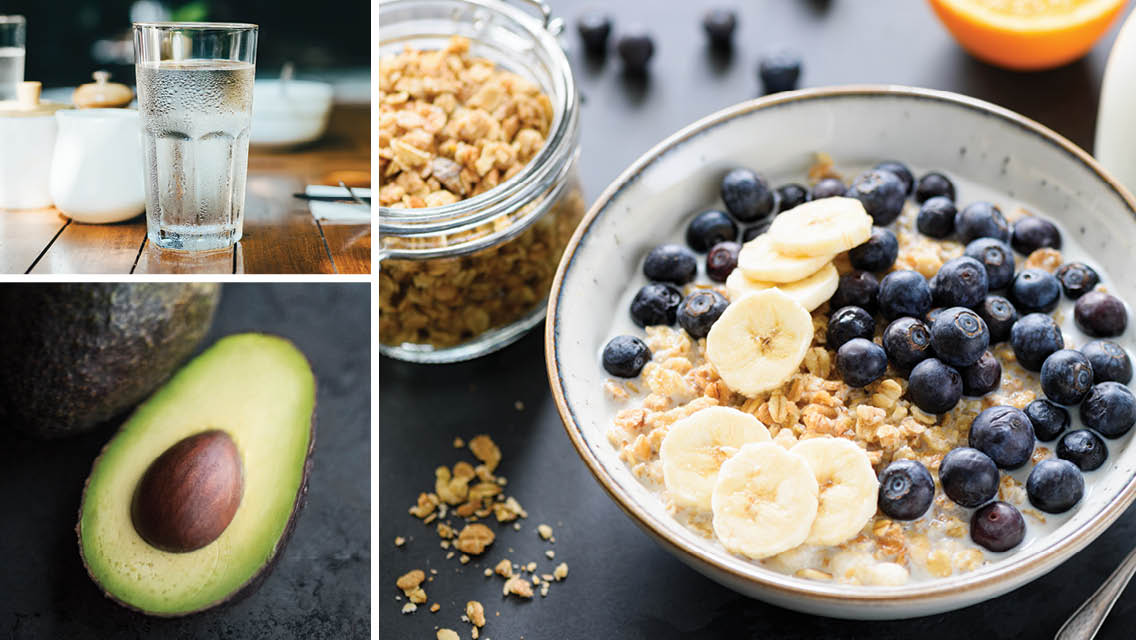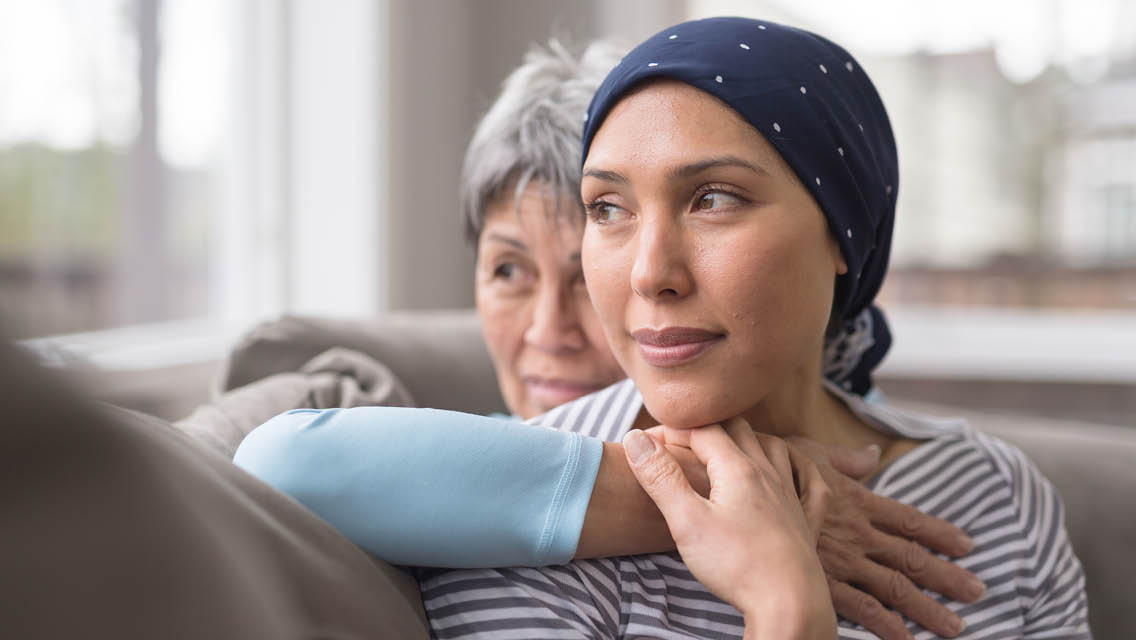Say you were raised by a quick-tempered parent, in a home that was rife with tense arguments. Or maybe you were bullied at school. You might have found security and consistency in sugary sweets. As an adult, you may find that those same treats call to you whenever you’re looking for comfort, to the point where you feel out of control.
Or you could have endured other types of trauma — abuse, the death of a close relative, or living with a deeply depressed parent. These experiences could affect your relationship with food in myriad ways well into adulthood.
Unresolved trauma is imprinted in our nervous system and leaves the body in survival mode. When we’re in survival mode for extended periods, we aren’t able to connect to our need to nurture and properly care for ourselves.”
“Unresolved trauma is imprinted in our nervous system and leaves the body in survival mode,” says registered nutritional therapist and Pilates instructor Kaysha Thomas. “When we’re in survival mode for extended periods, we aren’t able to connect to our need to nurture and properly care for ourselves.”
That’s because, she adds, “a traumatized brain downregulates the areas of the brain that are responsible for self-awareness. This means a person struggles to connect to internal body cues such as hunger, fullness, and satisfaction.”
For these reasons and more, some people might benefit from a trauma-informed approach to nutrition.
Rather than a singular technique, this is a model guided by six principles: safety; trustworthiness and transparency; peer support; collaboration and mutuality; empowerment, voice, and choice; and cultural, historical, and gender issues. Recognizing that trauma can affect our relationships with food, some providers are now incorporating that holistic approach into their nutrition practices.
Considering Trauma
“Trauma-informed nutrition looks beyond what we eat and helps a person understand why they eat, what they truly enjoy, and what has influenced their relationship with food and their body,” explains Thomas. The intention is to repair that relationship rather than focus on weight or BMI.
Childhood trauma can be particularly detrimental to health outcomes later in life, which is why many clinicians use the adverse childhood experiences (ACE) score — the number, up to 10, of traumatic events experienced before turning 18 — to assess a person’s risk factors.
Six in 10 people report they’ve endured at least one ACE, and one in six recall four or more. ACE exposure can drastically increase the risk of liver disease, severe obesity, type 2 diabetes, heart disease, stroke, and cancer.
Maya Feller, MS, RD, CDN, a registered dietitian nutritionist and adjunct faculty member at New York University, believes that ACEs “absolutely have an impact in nutrition. But in my practice, while they always inform, it’s also systems of oppression that create problems.”
Trauma-informed nutrition takes into account accumulated microaggressions, structural racism, and poverty during childhood. “It can be growing up food insecure in a neighborhood where there’s not a full-service grocery store,” Feller says. “That is also a traumatic experience around food.”
Care in Practice
Collaboration is key to Feller’s trauma-informed practice. “If we’re really talking about the patient understanding the nutrition prescription or us understanding what the patient needs, you have to listen,” she says. “We have to listen, and then we have to check in that they understand what’s happening and that it’s truly collaborative care.”
Nutritional psychiatrist Uma Naidoo, MD, author of This Is Your Brain on Food, also emphasizes the importance of collaborating with other healthcare professionals. “As a doctor, I always start with the diagnosis, or what happened to bring this person to my office. That might involve working with their primary-care physician, or getting some blood tests, but really working in collaboration with other treatment providers to make sure the patient receives the most comprehensive care.”
That could mean enlisting someone like functional nutritionist Jesse Haas, CNS, LN. Haas incorporates mindfulness techniques into her practice, like recommending that her clients take three to five deep breaths before they eat, or to put their fork down between bites. “That helps them slow down and be present with it,” she says.
It’s not just about being mindful so that you eat a salad; it’s being mindful so that you choose for yourself instead of just taking automatic actions.”
This is designed to help people notice what they’re doing, thinking, and feeling. “That brings objectivity,” Haas explains. “It’s not just about being mindful so that you eat a salad; it’s being mindful so that you choose for yourself instead of just taking automatic actions.” In other words, it’s about empowerment, voice, and choice.
Some of those food choices can actually help the healing process, too. “The gut microbiome is really pivotal in informing our mental health,” says Naidoo. “Individuals who may have had trauma could pay attention to things like eating prebiotic foods: oats, bananas, the allium family (garlic, leeks, onions) — simple foods that will nurture their gut.”
She also suggests adding fermented foods to your diet, including kimchi, miso, and kombucha. (For more on the connection between gut health and brain health, see “Healthy Gut, Healthy Brain“.)
Naidoo emphasizes that because trauma is multifactorial, diet alone is not a panacea — you may want to seek out therapy or other mental-health support.
Before embarking on a trauma-informed-nutrition approach, make sure you take the time to find a practitioner with whom you feel safe. “Trauma often comes with intense feelings of shame,” says Thomas, “which makes it difficult for a person to be in a position where they feel vulnerable.”
But, she adds, “a well-trained practitioner can create a space for the feelings and sensations that are in the room to do this work.”
7 Eating Tips for Trauma Recovery
Chronic stress can lead to the breakdown of healthy tissues. Support your body with these tips, adapted with permission from registered nutritional therapist Kaysha Thomas.
- Maintain a routine. Irregular meals send the signal that food is scarce and disrupts blood-sugar levels. The body produces cortisol as a result, which stimulates the release of glucose from its energy stores.
- Eat your omegas. Omega-3 fatty acids are anti-inflammatory and a structural part of brain-cell membranes. (For more on how to balance omegas, see “The Omega Balance“.)
- Taste the rainbow. Eating colorful vegetables and fruits ensures that you’re consuming a good variety of antioxidants. They help defend the body against the damaging effects of oxidative stress, which is often present with anxiety.
- Cut back on caffeine. Stimulants can disrupt your sleep function and increase the production of stress hormones. (Have questions about caffeine? Get answers at “How Does Caffeine Really Affect Your Health?“.)
- Consider magnesium. Including magnesium-rich foods in your diet helps relax tight muscles. Magnesium is also a key component in insulin regulation and restful sleep. (For more on this critical mineral, see “Magnesium: Your Body’s Spark Plug“.)
- Maintain your macronutrients. Protein is vital for the production of neurotransmitters, blood-sugar regulation, and tissue repair, and carbohydrates help maintain optimal energy and blood-sugar levels. Healthy fats support a range of metabolic functions.
- Hydrate. The human body is approximately 60 percent water, making hydration crucial for some of our most essential biological functions. It’s especially important for digestive function and waste elimination. (Learn more at “The Health Benefits of Drinking Water“.)
This article originally appeared as “Trauma-Informed Nutrition” in the March 2022 issue of Experience Life.





This Post Has One Comment
I have pondered the thought of a trauma bind with food.
I work with somatic healing for my trauma and I feel more confident that I can get my relationship with food to a healthier place in my life after reading this article.
I just couldn’t put words to what I felt when it came to my trauma and food as a child.
Thanks.
This is helpful in my healing and wellness